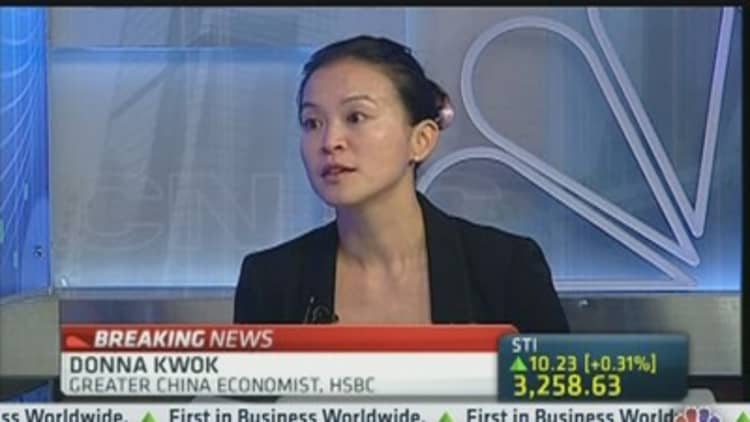A pick-up in Chinese manufacturing and expectations of monetary easing drove North Asian shares higher but political tensions in Seoul and Sydney put a cap on further regional gains.
The Nikkei hit a new four-and-half-year peak and the Shanghai Composite extended gains to hit a one-month high. Amid laggards, Seoul's benchmark closed at a fresh one-month low while Australia shares pared gains to lose 0.2 percent.
Signs of growth returned to China's manufacturing sector after the latest HSBC Flash PMI rose to 51.7 for the month of March, recovering from February's weaker holiday-impacted reading. Any increase above 50 marks an expansion in factory activity and signals a strengthening economy.
Sentiment was also lifted after the Federal Reserve re-affirmed its commitment to leave interest rates unchanged near zero and continue buying $85 billion in debt each month.
Elsewhere, focus remains on Cyprus where last-minute talks are being held to avert a looming default after the country's parliament overwhelmingly voted against a controversial EU bailout deal on Tuesday.
"I would be looking at hedged equity investment right now as a way of taking advantage of the current moves in the market," said Michael Mccarthy of CMC Markets, referring to investor uncertainty over Cyprus's 'Plan B' solution.

BOJ in Focus
Tokyo equities rallied over 1 percent to scale the 12,600-mark as investors await new Bank of Japan governor Haruhiko Kuroda's first policy speech on Thursday.
According to the Nikkei business daily, Kuroda is expected to use the opportunity to announce a radical policy shift to achieve the government's 2 percent inflation target.
The yen approached a three-and-a-half-year low against the dollar ahead of the speech and could weaken further on any conformation of bold stimulus measures.
While investors don't necessarily see Kuroda coming out with guns blazing, they do expect his comments to stabilize markets.
"I wouldn't expect him to outline any hard measures today, but rather a commitment to honor Mr. Abe's pledge of getting inflation up," said Nick Verdi of Barclays. "The stakes are very, very high as far as Mr. Kuroda's first (policy) meeting goes and the room for disappointment is quite large," he continued.

Shanghai Extends Gains
Shanghai shares rose for a third consecutive session as the benchmark pushed above the 2,300-level to hit a fresh one-month high with financials leading the rally.
China CITIC Bank gained 4.6 percent after the official Shanghai Securities News reported that China's big five banks could post a 12 percent increase in 2012 net profit.
However, Hong Kong shares reversed earlier gains to tread water in the afternoon session as investors digested a slew of corporate earnings.
Shares of Tencent Holdings, tumbled 4 percent after Deutsche Bank and CLSA downgraded China's largest internet services provider despite the firm posting a 25 percent rise in 2012 net profit.
In Sydney, the was under pressure as political uncertainty over Prime Minister Julia Gillard's leadership offset earlier gains from China's strong manufacturing data.
"People may be thinking a change of government may be good. Its been documented that most businesses haven't enjoyed the Labor government so that may have attracted some buying," said Gary Glover, senior equities advisor at Novus Capital.
(Read More: Political Strife in Australia? No Worries, Analysts Say)
Shares of surf wear retailer Billabong slumped 14 percent to an all-time low and the company has been placed on a trading halt in order to investigate the sudden decline.
Kospi Lags
Seoul stocks hit a fresh one-month low after North Korea's military threatened to attack U.S navy bases in Guam and Japan.
The index has struggled to push above the 2,000-mark in recent sessions after hitting a two-month high earlier this month as the continues to strengthen against the Japanese yen.
The won has appreciated 6 percent against the Japanese currency since the start of 2013, making Korean exporters less competitive as a stronger won decreases the value of their repatriated earnings.
"I wouldn't own anything in Korea because I think its going to get really hurt by Japan. Japanese earnings are turning around at the same that the Korean ones are decelerating," said Mark Matthews, head of research Asia at Bank Julius Baer.

